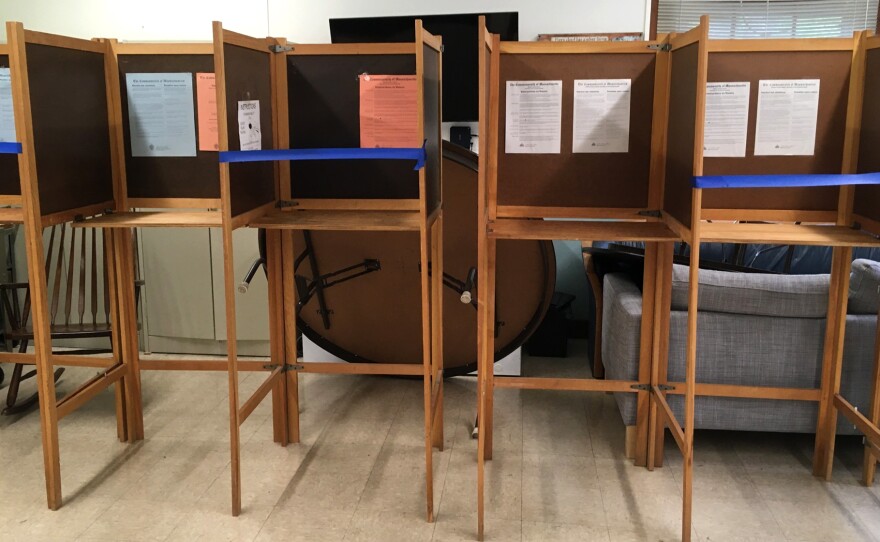The recent primary election demanded a lot of city and town clerks across Massachusetts — not only on the election day, but the days, weeks and even months preceding it.
Even without an election, the clerks keep busy. Many handle birth certificates, marriage licenses, death certificates, dog licenses and voter registration. Add a deadly pandemic to the mix, and these local officials had to figure out how to keep poll workers and voters safe on primary day.
Pittsfield City Clerk Michele Benjamin said the number of people allowed into a polling station at a time was limited.
“You’re given a pen at the check-in, and you bring it back to the checkout table,” Benjamin said. “They're being sanitized, and then returned back to the check-in.”
Those clean pens were for the voters who cast their ballots on primary day, but this year many early ballots were cast.
Otto Frizzell, West Springfield’s town clerk, said mail-in voting made it convenient because the ballot was essentially put in the voter’s hand.
“Typically, in an election like this, we would see between 100 and 200 absentee ballots,” Frizzell said. “And in this election, we saw 3,584 early votes cast. That number is significantly larger than the normal number for an election like this.”
That’s because of emergency legislation passed this summer, which directed the state to send an application for a vote-by-mail ballot to all registered voters.
It led to a lot more work for local officials, said Jennifer Messina, town clerk in Great Barrington.
"First, you have to process the application, and then you have to send them out, and then you have to take them back in," Messina said. "Every time you do one of those steps, there's work to be done in the state computer, plus run an office — plus run the everyday town clerk business."
Great Barrington sent out about 1,600 ballots. Normally, they have about 300 absentee voters.

In Lenox, Town Clerk Kerry Sullivan said this election she felt under constant pressure.
“Everybody wanted — they just couldn’t wait to vote this year. They just wanted to get started,” Sullivan said.
Voters had a lot of questions, beginning in July.
“‘When are you mailing the ballots out? I didn’t get mine yet,’” Sullivan said she was told. “And then people were even saying, ‘Are you mailing them both at the same time, the November one and September one?’ ‘No, I can’t do that because we don’t know who the candidates are yet. You know, that’s why we have the primary.’ It was a whole lesson in civics.”

Sullivan said once voters had their ballots, they weren’t sure the best way to return them, given concerns about the postal service.
“‘Should I mail it back? Should I drop it off? Where’s the drop box?’” she said. “I wish I had someone just manning the phones, but I tried to get the information out as best as I could.”
And on election day, in between the in-person voters, Jennifer Messina said in Great Barrington each mail-in ballot was checked in by a poll worker.
"And then you go over to the checkout, and then you put it in the machine," she said. "So it's basically like that person's there, except you're acting as that person for them on election day. So it takes a while to do it."
But it’s worth it, some say — like the group MassVote, which wants the temporary law expanding mail-in voting to be made permanent.
More than 1.7 million votes were cast, a record for a state primary in Massachusetts.
In Pittsfield, even before the polls opened on primary day, 300 more ballots had been cast than in the entire 2016 September primary.
“It’s exhausting. I'm hoping it’s not going to become the normal,” said Pittsfield City Clerk Michelle Benjamin.
Benjamin said more votes were cast, but there’s a cost to the way mail-in voting was run this time.
Pittsfield sent out about 8,000 mail-in ballots. More than 2,000 were not returned.
“We mailed them a ballot, and they never mailed it back. So it's a lot of work on a town and a city to produce that mailing,” she said.
Benjamin said rather than having the state send all registered voters an application for a mail-in ballot, it should be up to each voter to request one.
For many town clerks, the primary was kind of like a dress rehearsal, with last minute stage direction.
Kerry Sullivan of Lenox pointed out the state sent instructions in mid-August on how to process mail-in ballots.
"Every day, there would be a new notice about what to do," Sullivan said. "We all are already for November, that’s for sure, but it will not be so foreign to us. But I think it can work."
In Pittsfield, Michele Benjamin said in November, she is expecting as many as 70% of registered voters to cast votes. To make it work, she said she’ll need double the number of staff.
And Massachusetts Secretary of State Bill Galvin said this week he doesn't have money to help towns cover that extra cost.










